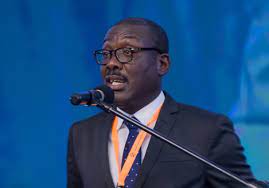GBA expresses willingness to partner Judicial Service to improve E-justice project November 18, 2021 41
It is possible to implement the legal ICT project immediately on a nationwide scale,” he contended.

The president of the Ghana Bar Association (GBA), Yaw Acheampong Boafu, has indicated that the association is willing to collaborate with the Judicial Service, to improve the E-justice or paper-less court project.
He says the GBA can garner efforts to find funding for the E-justice project, citing an automation levy.
“We believe, a properly executed project will be able to recover all investments through an automation levy.”
He also said the association of lawyers and the General Legal Council can within one year, recreate the E-justice project, by developing a product that will meet the needs of the legal system.
“The GBA and the Judiciary will therefore move our partnership for justice delivery to a new notch. With a joint implementation of technology, that will ensure justice delivery is accessible to all, during this pandemic and after the pandemic, ensuring that every citizen has access to justice in any corner of the nation using technology,” he said.
The E-justice project began in 2013; a project sponsored by the World Bank and being implemented by the Ministry of Communications and Messrs, a South African firm.
It was officially launched in March 2019 by President Akufo-Addo for a pilot phase.
“Through the e-Justice Project, an electronic platform is being provided for process filing, process service, fee assessments, and online payments. The platform, additionally, automatically assigns cases to courts and judges, a clear departure from the days of manual assignments, which had the tendency to pervert the course of justice,” the president is quoted to have said.
According to the Judicial Service, the project is expected to be rolled out to the Supreme Court, the Court of Appeal, all High and Circuit Courts in the regional capitals as well as the Tema Metropolitan area by 2022.
However, Mr. Boafu believes that with the experience lawyers gained in being part of the design and concept stages of the GBA’s digitisation system, a partnership with the Judicial Service will ensure that the E-justice works.
“The experience at the GBA has taught us lessons. While it will sound as if we had it all rosy at the GBA IT projects, only we, the internal team knew the failures we had executing the projects. Out of the failures, we learnt that IT people have no clue what we want in the legal field. But they pretend they know it all. And when you leave anything to them, with best and honest intentions, they ruin it and ruin the project,” he explained.
“We therefore need to assemble our own judges, lawyers, judicial administrators, and paralegals and not depend on outsiders no matter how skillful they are. We need to design our systems and specify how we want the system to feel like and look like. When we engage external skills, local or foreign expertise, they must operate strictly under the control of our select internal team, who must jealously guide the project.”
He was speaking at the 13th Annual Chief Justice’s Forum happening at Koforidua on the theme, ‘Justice for All under Constitutional Rule: Making Justice Delivery Accessible in a Pandemic.’
He particularly dismissed the idea of first piloting ICT projects in Ghana’s capital town before its extension to other regions.
“It is possible to implement the legal ICT project immediately on a nationwide scale,” he contended.
Chief Justice Kwesi Anin Yeboah also agreed that it is possible to implement the ICT project on a nationwide scale.
He, however, noted the Judiciary cannot do it alone and called for stakeholder engagement.


